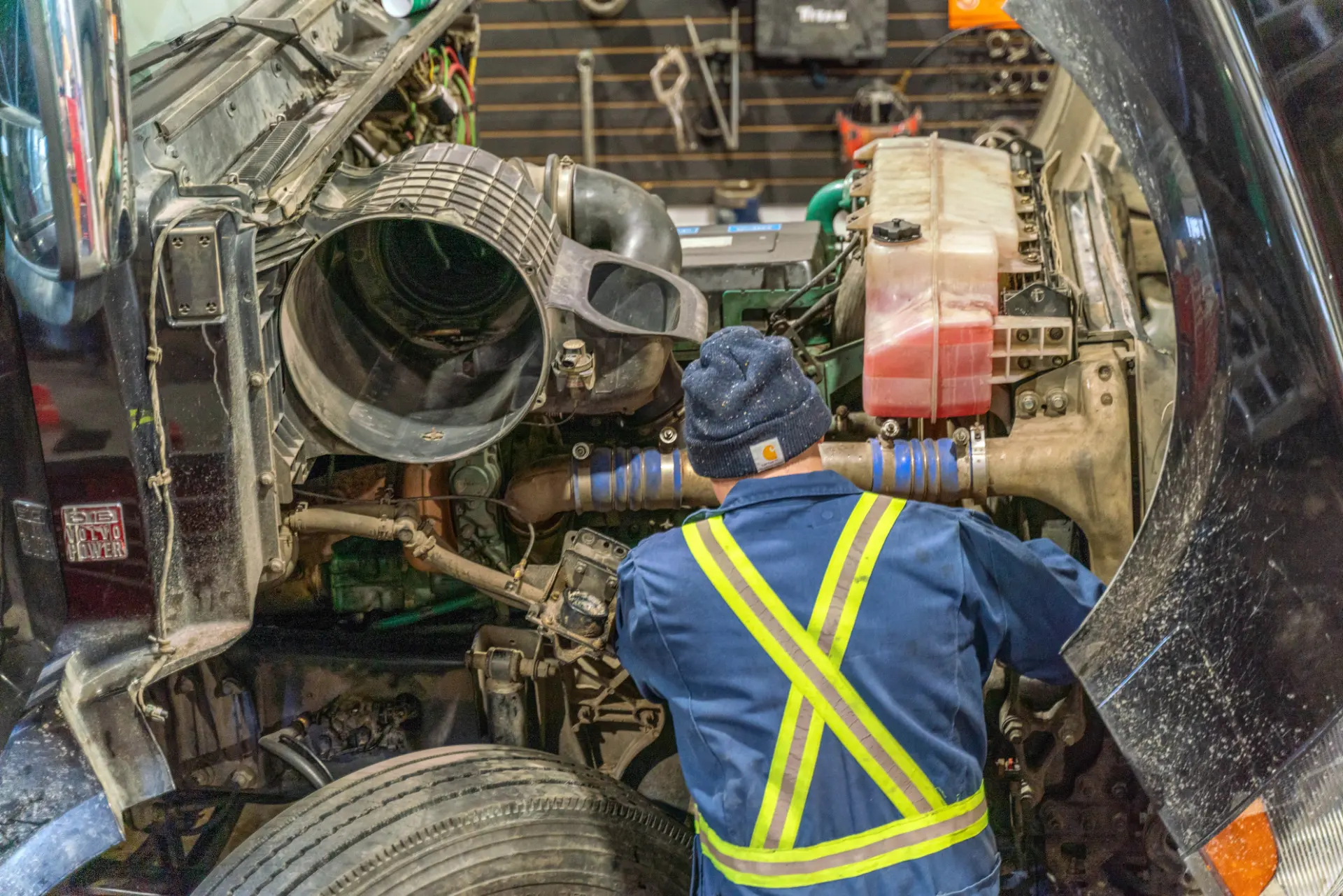Tips for Proper Radiator Cleaning and Maintenance in Heavy-Duty Trucks
Discover effective tips for maintaining and cleaning radiators in heavy-duty trucks. Explore the importance of radiator maintenance, common issues, preventive strategies, and a step-by-step guide for proper cleaning. Contact Fleetgo for professional and reliable radiator service.

Radiators are vital to the health and efficiency of heavy-duty trucks, playing a critical role in engine temperature regulation. Proper maintenance of the radiator system is not just a preventive measure; it's a necessary practice to ensure the longevity and performance of the truck. In this comprehensive guide, we'll explore practical radiator cleaning and maintenance strategies, focusing on techniques that help prevent overheating, reduce wear and tear, and extend the life of your heavy-duty truck.
Understanding the Role of the Radiator in Heavy-Duty Trucks
In heavy-duty trucks, the radiator is a crucial cooling system component. The radiator consists of narrow tubes and fins that maximize surface area for heat exchange. Coolant heated by the engine flows into the radiator, cooled by air passing through the fins. The cooled liquid returns to the engine, maintaining an optimal operating temperature. This cycle is critical, especially in heavy-duty trucks that operate under high-load conditions, where the risk of overheating is greater.
It transfers heat from the engine's coolant to the air, thus regulating its temperature. This process is crucial because an overheated engine can lead to severe damage, including warped components and engine failure. Effective radiator maintenance ensures that this heat exchange process occurs without hindrance. Factors like external blockages, internal cloggings, and coolant degradation can impair radiator function. Regular cleaning and maintenance not only prevent these issues but also enhance the overall efficiency and lifespan of the truck's engine.
Common Radiator Issues in Heavy-Duty Trucks
Common radiator problems in heavy-duty trucks often stem from neglect and harsh operating conditions. One frequent issue is clogging, where dirt, debris, or sediment accumulates in the radiator, hindering coolant flow and heat dissipation. This can cause the engine to overheat, reducing efficiency and potential mechanical failures.
Radiator leaks are another common problem. They can occur in the radiator itself or the connecting hoses and result in a loss of coolant. This diminishes the radiator's ability to cool the engine, possibly leading to overheating. In addition, corrosion over time can weaken the radiator, making it more susceptible to leaks and damage.
Regular inspections can identify these issues early, allowing for timely interventions. Checking for signs of leaks, monitoring coolant levels, and observing the engine's temperature gauge are simple yet effective ways to keep tabs on the radiator's condition. Addressing these issues promptly is vital in maintaining the truck's performance and preventing more serious, costly problems.
Preventive Maintenance Strategies
Preventive maintenance is crucial for keeping the radiator in optimal condition. Regular inspections are the first line of defense. Check the radiator and associated hoses for any signs of wear, leaks, or damage. This includes looking for cracks, bulges, or discolored spots on the hoses, and checking the radiator for any signs of corrosion or leaks.
It's equally important to maintain the correct coolant level and concentration. Coolant not only helps in heat dissipation but also prevents corrosion within the cooling system. Use the manufacturer-recommended coolant and adhere to the suggested mixture of coolant and water. Regularly check the coolant level and top it up if necessary. It's also wise to perform a coolant flush at intervals recommended by the truck manufacturer to remove contaminants and replenish the system with fresh coolant.
Another critical aspect of preventive maintenance is keeping the radiator free from external blockages. Dirt, leaves, and debris can accumulate on the radiator fins, obstructing airflow and reducing cooling efficiency. Regular cleaning of the radiator exterior is essential, especially in trucks operating in dusty or dirty environments.
Lastly, keep an eye on the thermostat and the water pump, as these components play a critical role in the cooling system's functionality. A malfunctioning thermostat can prevent coolant from flowing through the radiator, while a faulty water pump can hinder the circulation of the coolant. Ensuring these parts are in good working condition is vital for the overall health of the radiator system.
Step-by-Step Guide to Radiator Cleaning
Cleaning the radiator is a crucial part of maintenance. Here’s a step-by-step guide to ensure it's done effectively:
- Safety First: Before starting, make sure the engine is excellent. Open the radiator cap cautiously to relieve any pressure.
- Exterior Cleaning: Remove debris, leaves, or dirt from the radiator fins. Use a soft brush or compressed air to gently clean the fins gently, being careful not to bend them.
- Flush the Radiator: Drain the old coolant into a container for proper disposal. With the drain plug open, run water through the radiator to flush out any sediment or contaminants. Use a radiator flush solution following the manufacturer’s instructions for a more thorough cleaning.
- Inspect for Leaks: After flushing, inspect the radiator, hoses, and connections for any signs of leaks. Small leaks can often be repaired, but significant damage may require part replacement.
- Refill Coolant: After cleaning and securing all connections, refill the system with the appropriate mixture of coolant and water. Start the engine and let it run for a few minutes with the heater on high, then recheck the coolant level and top up if necessary.
- Check the System: After refilling, monitor the radiator and cooling system for a few days to ensure no leaks and the engine maintains the correct operating temperature.
Addressing Radiator Repairs and When to Seek Professional Help
Repairs can often be done in-house with the right tools and expertise for minor radiator issues like small leaks or hose replacements. However, it's advisable to seek professional assistance regarding more complex problems such as significant leaks, severe corrosion, or damage to the radiator core.
A specialized repair service can provide a thorough inspection, identify the root cause of the problem, and offer reliable repair or replacement solutions. They can advise on potential upgrades or improvements to enhance the radiator's performance and durability. Remember, timely and professional repairs save costs in the long run and ensure the safety and reliability of your heavy-duty truck.
Contact Us
Look no further if you seek expert service for your heavy-duty truck's radiator issues. At Fleetgo, our skilled mechanics specialize in thorough inspections, efficient repairs, and comprehensive maintenance to keep your trucks running smoothly. Trust us to ensure your vehicle's reliability and your peace of mind on the road. Contact us today for professional, reliable service tailored to your heavy-duty truck needs.
More Articles

Why Vibration at Highway Speed Often Points to Driveline Problems

Why Uneven Brake Wear Signals Bigger System Issues

Early Signs of Differential Failure in Heavy-Duty Trucks
Contact FleetGo
Get in touch with Fleetgo today to request a quote or to schedule in-shop or mobile services in Edmonton & the surrounding area! Our mobile service extends to a 100km radius around Edmonton for emergency roadside assistance & mobile truck & fleet repairs, including Sherwood Park, Spruce Grove, Fort Saskatchewan, St. Albert, Stony Plain, along Highway 16, & more!


